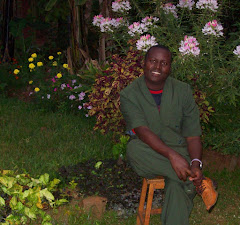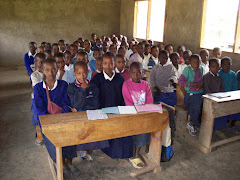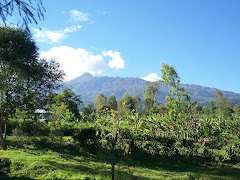As we get closer to the Tengeru market in Tanzania, our senses are increasingly bombarded. The sights, sounds and smells vividly announce to us that we have arrived. Vibrant color is everywhere – in the clothes worn by the people, and in the fresh produce for sale. In the food stalls, vendors announce their prices and encourage potential buyers to purchase from them instead of from the 20 people near them selling the same produce at the exact same price. There are street vendors frying fish and roasting corn to buy for a tasty snack. Even the sense of touch is not spared as we navigate shoulder against shoulder, pushing through the crowds.
As we pass stall after stall displaying huge bags of beans and grains, women busily sift beans and kernels of corn over a wood-framed screen to remove stones and other debris. Heaping buckets of beans and grain are measured out for buyers, and then poured into baskets, buckets and those black plastic bags seen everywhere at Tanzanian markets.
Young boys, trying to earn an income to help support their families, walk among the potential customers with the handles of empty, black plastic bags draped over their forearms. These boys are alert and street smart. They instinctively know when a purchase is about to be made, and are standing close by ready to sell to you a black plastic bag at the exact moment that you need to buy a black plastic bag for your purchase.
Unlike the proliferation of plastic bags available at stores here in the USA, plastic bags are not free with your purchase in Tanzania. If you need a plastic bag, it will cost you 100-shillings (about 7-cents). Yet, for the Tanzanian family struggling to survive on an average annual income of less than $400 a year (about $1 a day), even the purchase of a 7-cent bag is financially difficult.
Shopping at market without buying a black plastic bag from one of the boys is certainly possible if you’ve brought your own basket or bucket with you (which is at the same time an unfortunate “catch 22” for the boys trying to earn an income selling 7-cent bags).
But sometimes the purchase of one of those black plastic bags becomes a necessity. If you are fortunate enough to have money to purchase a piece of beef or goat meat from the butcher, the meat is unceremoniously hacked off of the hanging animal carcass, tightly wrapped in layers of old newspaper and handed directly to you. Suffice to say, at this point, with blood from the meat beginning to seep through the newspaper, a black plastic bag passes beyond luxury to necessity.
When I go to the Tengeru Market, I look for the boys from our village. They aren’t too hard to find once I am near the entrance to the busiest area of the marketplace. Or rather, maybe it is I, the lone white woman in a sea of Africans who is not hard to spot, and one of the boys from our village usually finds me before I find one of them.
Greetings are exchanged, and one of the young boys follows me as I walk through the marketplace. Even as he watches for other potential customers in our vicinity while I am shopping, he doesn’t stray far from me. He is always ready with a black plastic bag whenever I purchase something, and then insists on carrying all of my purchases, too.
When we are done, I press several shilling coins into the palm of his hand. He looks and sees an amount more than the cost of the few black plastic bags I needed. As he reaches in his pocket to give me change, I smile at him with a small shake of my head, and I close his hand tightly around the coins and motion for him to put them safely in his pocket. He understands. There is a shy smile on his lips, but his dark eyes reflect a solemn appreciation.
In that simple, silent exchange, he knows that I understand the struggles of his family to survive in this 3rd world country.
Tuesday, January 11, 2011
Subscribe to:
Post Comments (Atom)

+-+Copy.jpg)


.jpg)
.jpg)




No comments:
Post a Comment